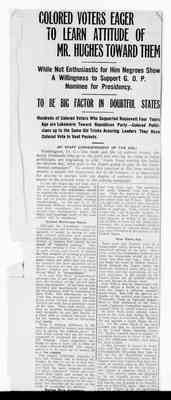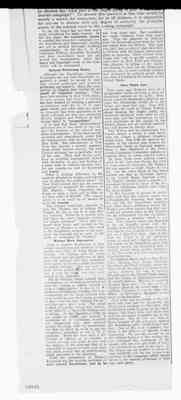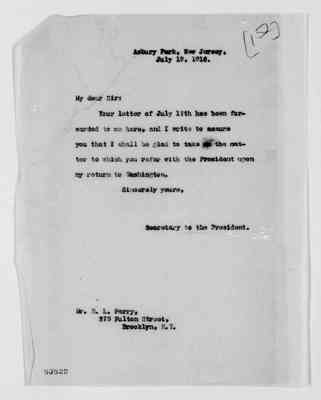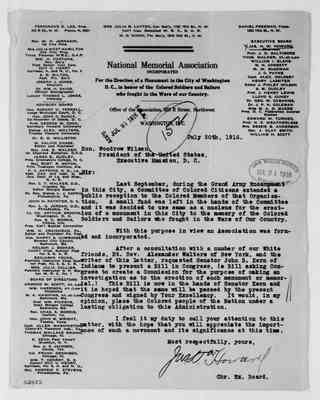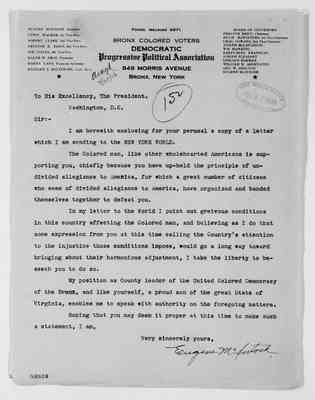Pages
1136
COLORED VOTERS EAGER TO LEARN ATTITUDE OF MR. HUGHES TOWARD THEM
While Not Enthusiastic for Him Negroes Show A Willingness to Support G. O. P. Nominee for Presidency.
TO BE BIG FACTOR IN DOUBTFUL STATES
Hundreds of Colored Voters Who supported Roesevelt Four Years Ago are Lukewarm Toward Republican Party—Colored Politiclans up to the Same Old Tricks Assuring leaders they Have Colored Vote in Vest Pockets. (BY STAFF CORRESPONDENT OF THE AGE.)
Washington, D. C.—The rank and file of colored voters, the many thousands who go to the polls but who lay no claim to being politicians, are beginning to ask: "Aside from casting his ballot on election day, what part is the Negro going to play in the Presidential campaign?" To answer this question at this time would be merely a matter for conjecture, for in all fairness, it is impossible for anyone to discuss with any degree of authority the probable status of the colored voter in the coming campaign.
[left column] So far, the Negro has not been seriously considered for many reasons. In the first place, the committees chosen to conduct the respective campaigns for the Republican and Democratic parties are yet to perfect thorough working organizations. As for the G. O. P., and their co-workers have not yet moved into headquarters where the heavy and important work of the committee will be transacted.
Colored Politicians Ready.
Although the Republican Campaign Committee has not been thoroughly organized, it would be wrong to state that colored politicians and would-be politicians are inactive. Since the nomination of Hughes they cannot be accused of "watchful waiting." They have been meeting in New York singly, in pairs, in groups and crowds to discuss the best method of forming a personal acquaintance with the G. O. P. campaign funds, and while they are aware no treasurer has been appointed or no funds collected, yet they are convincing Messrs. Hughes and Wilcox of their strong belief in "preparedness."
It is said that these "preparedness" advocates are of one mind on one subject—the location of the colored campaign headquarters. It has been moved, seconded and unanimously voted that the headquarters shall be maintained in New York. But whereabouts in New York has become a mooted question. Some prefer Harlem scenery, but each Harlem advocate has a particular street of his own. Then such knotty problems as securing headquarters lighted with electricity or gas, and leasing of a place with or without elevator service are causing no end of discussion a and worry.
What a striking difference in the methods adopted by women and colored men in playing the political game? In New York several days ago the women organized to promote the election of Mr. Hughes. Upon organizing they began to raise a fund and in little or no time collected $25,000. The organization is to be made up of women all over the country.
The colored politicians organize to help Mr. Hughes, but in helping Mr. Hughes he has to see to it that they are financed. When he is elected who will have the more strategic position for future influence? Those who collected their funds and worked in the interest of Hughes or those who went to the Republican nominee or his managers for financial aid to carry on the work of promoting his election?
Women More Aggresive
[right column]
was four years ago. But conditions are vastly different from four years ago. Then the majority of Negroes were for Roosevell, some were for Taft and others were for Wilson. This year you can't find a colored man favorable to Wilson with the largest observation glass in captivity. Even colored Democrats who vote in goodly numbers in such cities as New York and Chicago, take pleasure in telling of the wholesale knifing in store for the Democratic nominee, who is more cordially disliked and distrusted by colored people than any other President in the history of the United States.
Four Years Ago.
Four years ago Negroes were in a disagreeable mood, showing a most independent attitude at the polls. Hundreds voted the Democratic ticket to see what the Democrats would do if the Negro met them half way. How Wilson broke his word to Bishop Walters about treating the Negro justly, the wholesale dismissal from office of colored men and the segregation of colored employees in the capital of the United States are all painful subjects too well known to discuss here.
Had Wilson and his Democratic followers shown a desire to deal fairly with the Negro a different situation might exist. But with the present antipathy of the colored man toward the Democratic Party on National matters, there is little likelihood of the Democratic Campaign Committee making an especial effort to corral colored voters.
In New York some colored voters point to the fact that during his term of four years as Governor, Mr. Hughes did not appoint a single Negro to office. On the other hand, it has been pointed out that as Associate Justice of the United States Supreme Court, Mr. Hughes handed down a number of important decisions in favor of the Negro, the Oklahoma election case being the most notable.
At this juncture it cannot be truthfully said that the colored voters are enthusiastically throwing their hats in the air for the Republican nominee, and when Negro politicians assure Mr. Hughes and other leaders that they may count on colored votes, as the Negroes are all enthusiastic for the ex-Justice, they picture a situation which is not true. The colored voters are disposed to be on friendly terms with Mr. Hughes and will be if he makes it manifest that he, too, is going to be friendly, and on a fifty-fifty basis. Just at this time the Negro is in an optimistic
1137
on election day, what part is the Negro going to play in the Presidential campaign?" To answer this question at this time would be merely a matter for conjecture, for in all fairness, it is impossible for anyone to discuss with any degree of authority the probable status of the colored voter in the coming campaign.
[left column] So far, the Negro has not been seriously considered for many reasons. In the first place, the committees chosen to conduct the respective campaigns for the Republican and Democratic parties are yet to perfect thorough working organizations. As for the G. O. P., and their co-workers have not yet moved into headquarters where the heavy and important work of the committee will be transacted.
Colored Politicians Ready.
Although the Republican Campaign Committee has not been thoroughly organized, it would be wrong to state that colored politicians and would-be politicians are inactive. Since the nomination of Hughes they cannot be accused of "watchful waiting." They have been meeting in New York singly, in pairs, in groups and crowds to discuss the best method of forming a personal acquaintance with the G. O. P. campaign funds, and while they are aware no treasurer has been appointed or no funds collected, yet they are convincing Messrs. Hughes and Wilcox of their strong belief in "preparedness."
It is said that these "preparedness" advocates are of one mind on one subject—the location of the colored campaign headquarters. It has been moved, seconded and unanimously voted that the headquarters shall be maintained in New York. But whereabouts in New York has become a mooted question. Some prefer Harlem scenery, but each Harlem advocate has a particular street of his own. Then such knotty problems as securing headquarters lighted with electricity or gas, and leasing of a place with or without elevator service are causing no end of discussion a and worry.
What a striking difference in the methods adopted by women and colored men in playing the political game? In New York several days ago the women organized to promote the election of Mr. Hughes. Upon organizing they began to raise a fund and in little or no time collected $25,000. The organization is to be made up of women all over the country.
The colored politicians organize to help Mr. Hughes, but in helping Mr. Hughes he has to see to it that they are financed. When he is elected who will have the more strategic position for future influence? Those who collected their funds and worked in the interest of Hughes or those who went to the Republican nominee or his managers for financial aid to carry on the work of promoting his election?
Women More Aggresive
Here is another illustration of how widely colored men and members of the gentler sex differ in doing this politically. At Chicago and St. Louis the women were so aggresive in their fight for suffrage that they compelled both parties to insert a plank favorable to female suffrage. This was done by both parties against their will, but they did it just the same, for they were afraid to do otherwise.
But at Chicago, when colored men, representing an element more powerful than the women as voters, desired to have a plank inserted in the G. O. P. platform denouncing lynching, the representatives of the large colored vote were unable to gain their point, as most of them were too busy "turning 'em on," and having a good time. The usual method of getting this was consistently adhered to, however—talking and resolving. At the Apomattox Club, in the midst of the jollity and oratory, a handsome set of resolutions, evidently for ornamental use, were adopted against lynching, with the understanding that an effort be made to get the resolutions embodied in the G. O. P. platform. There has been such a difference in opinion as to whether a sincere attempt was made to win over the makers of the platform that it is impossible to report correctly just what was done, except that no anti-lynching plank appeared in the platform.
Until the nomination of Hughes, Roosevelt was the favorite candidate of most colored Republicans, just as he
[right column]
was four years ago. But conditions are vastly different from four years ago. Then the majority of Negroes were for Roosevell, some were for Taft and others were for Wilson. This year you can't find a colored man favorable to Wilson with the largest observation glass in captivity. Even colored Democrats who vote in goodly numbers in such cities as New York and Chicago, take pleasure in telling of the wholesale knifing in store for the Democratic nominee, who is more cordially disliked and distrusted by colored people than any other President in the history of the United States.
Four Years Ago.
Four years ago Negroes were in a disagreeable mood, showing a most independent attitude at the polls. Hundreds voted the Democratic ticket to see what the Democrats would do if the Negro met them half way. How Wilson broke his word to Bishop Walters about treating the Negro justly, the wholesale dismissal from office of colored men and the segregation of colored employees in the capital of the United States are all painful subjects too well known to discuss here.
Had Wilson and his Democratic followers shown a desire to deal fairly with the Negro a different situation might exist. But with the present antipathy of the colored man toward the Democratic Party on National matters, there is little likelihood of the Democratic Campaign Committee making an especial effort to corral colored voters.
In New York some colored voters point to the fact that during his term of four years as Governor, Mr. Hughes did not appoint a single Negro to office. On the other hand, it has been pointed out that as Associate Justice of the United States Supreme Court, Mr. Hughes handed down a number of important decisions in favor of the Negro, the Oklahoma election case being the most notable.
At this juncture it cannot be truthfully said that the colored voters are enthusiastically throwing their hats in the air for the Republican nominee, and when Negro politicians assure Mr. Hughes and other leaders that they may count on colored votes, as the Negroes are all enthusiastic for the ex-Justice, they picture a situation which is not true. The colored voters are disposed to be on friendly terms with Mr. Hughes and will be if he makes it manifest that he, too, is going to be friendly, and on a fifty-fifty basis. Just at this time the Negro is in an optimistic frame of mind and is hoping the standard bearer of the Republican party will strongly profess his friendship and, if elected, accord them similar treatment as did Roosevelt and Taft during their administrations.
In doubtful states, such as New York, Ohio, Indiana, New Jersey, Missouri, Maryland and West Virginia, where the Negro holds the balance of power in the various districts, his help in sending Republicans to the United States Senate and the House of Representatives will be greatly needed. He will be more in demand than ever. In the event of Hughes' election, he would need a Republican Congress to put his ideas into effect. A Democratic Congress would prove a big handicap.
Four years ago two-thirds of the colored vote was cast for Roosevell, the Progressive nominee for President. The politician is ready to jump on the bandwagon, but those who cast their vote and are not active in polities are so far indifferent. But to sulk and stay at home because of old grievances against the Republican party would be bad politics. No one has loomed up on the political horizon at this writing who can command the confidence of the people, who are sick and tired of those who professed to lead in the past. If the Negro can get leaders in whom he may implicitly rely he can secure concessions in this campaien which should prove to the mutual advantage of both race and party.
83821
1138
[152]
Ashbury Park, New Jersey, July 19. 1916.
My dear Sir:
Your letter of July 17th has been forwarded to me here, and I write to assure you that I shall be glad to take [up?] the matter to which you refer with the President upon my return to Washington.
Sincerely yours,
Secretary to the President.
Mr. R. L. Perry, 375 Fulton Street, Brooklyn, N.Y.
83822
1139
[stamp: ACK'D JUL 21 1916]
152
July 20th, 1916.
Hon. Woodrow Wilson, President of the United States, Executive Mansion, D. C.
Sir:
Last September, during the Grand Army Encampment in this City, a Committee of Colored Citizens extended a public reception to the Colored Members of that Organization. A small fund was left in the hands of the Committee and it was decided to use same as a nucleus for the erection of a monument in this City to the memory of the Colored Soldiers and Sailors who fought in the Wars of Our Country.
With this purpose in view an Association was formed and incorporated. ENIAMIN VOUNG.
After a consultation with a number of our White friends, Rt. Rev. Alexander Walters of New York, and the writer of this letter, requested Senater John B. Kern of Indiana to present a Bill in Congress, (a Bill asking Congress to create a Commission for the purpose of making an investigation as to the erection of such monument or memorial.) This Bill is now in the hands of Senator Kern and it is hoped that the same will be passed by the present Congress and Signed by Your Excellency. It would, in my opinion, place the Colored people of the Nation under a lasting obligation to this Administration.
I feel it my duty to call your attention to this matter, with the hope that you will appreciate the importance of such a movement and its significance at this time.
Most respectfully, yours, Jas. H. W. Howard Chr. Ex. Board.
83823
1140
Ackd 7/27/16
152
[stamp: THE WHITE HOUSE JUL 27 1916 RECEIVED]
To His Excellency, The President. Washington, D.C.
Sir:-
I am herewith enclosing for your perusal a copy of a letter which I am sending to the NEW YORK WORLD.
The Colored man, like other wholehearted Americans is supporting you, chiefly because you have up-held the principle of undivided allegiance to America, for which a great number of citizens who seem of divided allegiance to America, have organized and banded themselves together to defeat you.
In my letter to the World I point out greivous conditions in this country affecting the Colored man, and believing as I do that some expression from you at this time calling the Country's attention to the injustice those conditions impose, would go a long way toward bringing about their harmonious adjustment, I take the liberty to beseech you to do so.
My position as County leader of the United Colored Democracy of the Bronx, and like yourself, a proud son of the great State of Virginia, enables me to speak with authority on the foregoing matters.
Hoping that you may deem it proper at this time to make such a statement, I am,
Very sincerely yours,
Eengene McIntosh
83824
